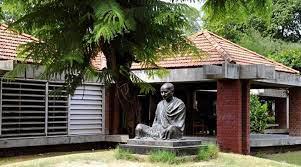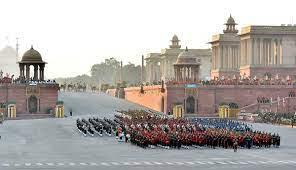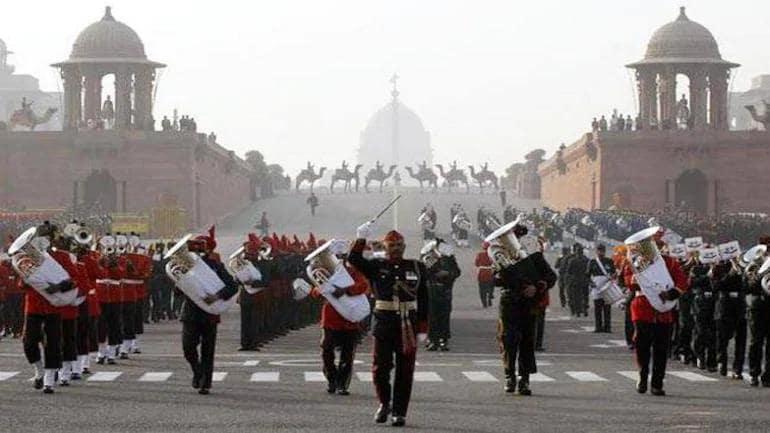"Abide with me ...Change and decay in all around I see... O Thou who changest not, abide with me"
The freedom which we enjoy today is the result of the toil and countless sacrifices made by thousands of sons and daughters of our country.In committing themselves to this mission with spirit and grit, they rose above all other social divisions and barriers.It also reminds us that for centuries, India has been a repository of wisdom, anchored in the conviction of vasudhaiva kutumbakam (The whole world is one family).

Mohandas Karamchand Gandhi, one of the greatest personalities of 20th century had a huge and profound influence on world population with regard to many issues. He had an interest in everything and anything that concerns individuals and society.With resilience and resolve, Gandhiji carried forward the torch of our nation’s guiding philosophy, which has been the underlying message of the Rig Vedic verse, “Ekam sat, vipraah bahudhaa vadanti (Truth is one, but the sages call it by many names)”.

Gandhi's philosophy is not a rigid, inflexible doctrine, but a set of beliefs and principles which are applied differently according to the historical and social setting. There is no dogmatism, and inconsistency is not a sin.Interpretation of the principles underwent much evolution during Gandhi's lifetime, and as a result many inconsistencies can be found in his writings, to which he readily admitted.In the April 1933 edition of "Harijan", one of Gandhi's journals, he states straightforwardly: "I would like to say to the diligent reader of my writings and to others who are interested in them that I am not at all concerned with appearing to be consistent. In my search after Truth I have discarded many ideas and learnt many news things.... What I am concerned with is my readiness to obey the call of Truth, my God, from moment to moment, and therefore, when anybody finds any inconsistency between any two writings of mine, if he still has any faith in my sanity, he would do well to choose the later of the two on the same subject."
Gandhi defined his idea of Swaraj for the nation as a collective capacity of individuals to live together in peace and harmony. He wrote in Hind Swaraj that it is Swaraj when we learn to rule ourselves and it is, therefore, in the palm of our hands.Music has shaped cultures and societies around the world, passed down from generation to generation. It has the power to alter one's mood, change perceptions and inspire change.

Sabarmati Ashram in Ahmedabad, the ashram bhajanavali — the first and probably the only cross-religion hymnal anywhere — with the bhajans ‘Vaishnav Jan Toh’ and the well-known Ram Dhun by Tulsidas, ‘Raghupati Raghav Raja Ram’ in it, Abide With Me, along with Lead Kindly Light, were put together under Gandhiji's guidance.
Lead, Kindly Light provides comfort and reassurance that God leads when we are lost and the poem received immense popularity after Newman wrote it; many can relate to the feeling of renewed hope after calling upon God for strength.Gandhi first heard the hymn as a boy, possibly while studying at the Alfred High School in Rajkot and undoubtedly he heard it often as a law student in London.

For Mahtama Gandhi “Abide with me” was a prayer for courage and strength during the frustrating years of the freedom struggle.The Father of the Nation first heard "Abide with me" played by Mysore Palace Band, and could not forget its tenderness and serenity.When Gandhi returned to India, after two turbulent decades in South Africa, he decided that "Lead, kindly Light" would be the motto of the independence movement.
He meditated daily on the lyric and encouraged his supporters to do the same. He broke fasts with the singing of the hymn, "He chastised the press with it. He quoted it in difficult conversations with the Viceroy, Lord Irwin, during the civil disobedience movement." And he had the hymn translated into Gujarati so it could be sung at the daily prayers at sabarmati ashram.

"Abide with Me" is a Christian hymn by Scottish Anglican Henry Francis Lyte in 1847.The title of the hymn is taken from Luke 24:29, when those who walked with Christ on the road to Emmaus said, “Abide with us, for it is toward evening, and the day is far spent.”It is most often sung to the tune "Eventide" by William Henry Monk.
The hymn is not confined to religious belief, but is universal in its humanistic appeal and has been a fixture in the Indian Beating Retreat ceremony since 1950.It is always the last piece to be played by the brass bands before the troops recede up Raisina Hill to the tune of poet Allama Iqbal’s "Saare jahan se achha".

Abide with me; fast falls the eventide;
The darkness deepens; Lord, with me abide.
When other helpers fail and comforts flee...
Henry Wadsworth Longfellow wrote, “Music is the universal language of mankind".Music has a way of filling in the gaps in thought, feeling, and emotion that words cannot do justice.In 2018, a research team of anthropologists, psychologists, biologists, musicians and linguists from top universities around the globe confirmed through computational data that "music is the universal language of mankind."
Different kinds of music are now available to most people, 24 hours a day, at the touch of a switch and In some societies the power of this medium is recognized and attempts are made to control music by those in power.The Indian government has dropped "Abide With Me",from the "Beating the retreat" ceremony this year 2022.

A recent press note issued attributed to government sources, stated that the change is part of an ongoing exercise to change the colonial tunes adapted by the Indian Army.It mentioned that the song ‘Aye Mere Watan ke Logon’ “evokes a strong sense of patriotism with all Indians” as the lyrics can be understood by all citizens.
"Aye Mere Watan Ke Logo"is written in Hindi by Kavi Pradeep, composed by C. Ramchandra, and sung by the legendary Lata Mangeshkar. The song commemorates Indian soldiers who died during the Sino-Indian War in 1962.Undoubtedly, listening to "aye mere watan ki logon" fills us all with patriotic feelings and i remember it from my school days when we used to practice for the republic day march past.Our hearts used to swell with pride.

However,"Abide with me" has also been the most memorable musical experience over almost last half-a-century,of "Beating the retreat's" and a part of our military culture.And if the song has to be among the world’s most moving hymns, that tune has to be among the world’s most heart-wrenching melodies and listening to it at the beating of retreat ceremony all these years has always been a deeply profound experience.
As the winter sun dips behind Raisina Hill, it swathes the house of India’s President atop that hill with a halo of golden twilight. The North and South Blocks beside it, similarly, turn bronze with the pealing bells followed by an echo effect created by musicians posted atop the buildings.
It wouldn't be an exaggeration to say that time stands still for those few moments and not one spectator shuffles in his or her seat and most eyes are moist with emotion at the end.I can only appeal to the finer sensibilities of the authorities not to be impervious to the song’s aesthetic, spiritual and human appeal.Gandhi,the father of our nation loved it.

"The words are universal, the tune human,” Gopalkrishna Gandhi, former West Bengal Governor and a diplomat wrote in an article.Can a prayer for God to stay with the speaker throughout life and in death affront,hurt and offend anyone? It only provides comfort and reassurance that God leads when we are lost.
Removing such an universal hymn from the "Beating the retreat" ceremony is echoing the frog in the well proverb.Instead of being parochial & narrow minded let's embrace the larger world just like Bapu did many decades ago.The international community is getting closer & closer and individual identity is transcending geographical & political borders to a membership in a broader class:"Humanity".
Comments (10)









